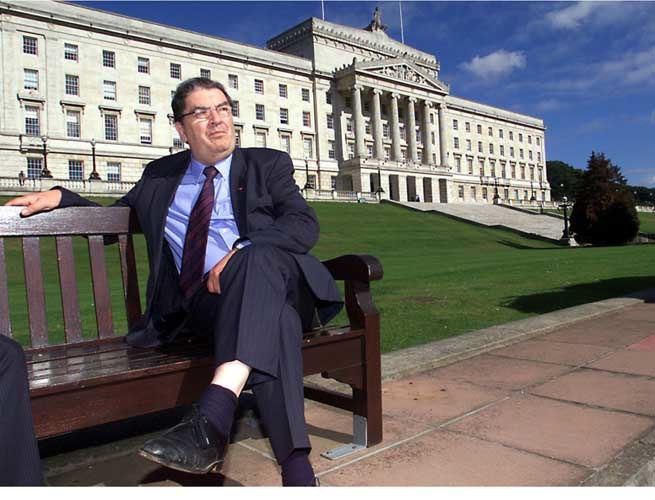A DISRUPTIVE SYSTEM OF GOVERNMENT

John Hume with the source of all, or at least many, of our troubles
In the early 1980s, it was possible to believe (I certainly believed) that Northern Ireland was headed, on autopilot so to speak, towards what could have been a stable and permanent settlement. In principle, the political problem had been solved in 1972, with the 'suspension' of Stormont. Precisely because of the Catholic/Protestant division, Northern Ireland was the part of the United Kingdom least suitable for the establishment of a devolved government. In Northern Ireland, devolved government could only mean a permanent Unionist (Protestant) majority lording it over a permanent Nationalist (Catholic) minority. This was obviously not what the Catholic minority wanted. But the Catholic position wasn't a simple matter of Republican sentiment. Catholic Ulster had been a redoubt of the old Home Rule movement against the new, determinedly separatist, Sinn Fein. The leading Ulster Catholic politician, Joseph Devlin, was well connected in Westminster and particularly well placed with regard to the emergence after the First World War of the Labour Party. He had been very much looking forwards to continuing his Westminster career under the new circumstances that would have been created by Home Rule (a relatively minor devolution of power analogous to the present arrangements for Scotland and Wales). Even after partition, if Northern Ireland had continued to be governed directly by Westminster he would have made a formidable tribune for the Ulster Catholics. As it was, with effective power in the hands of his lifelong enemies, and all the political parties in Westminster washing their hands of responsibility for the place, it was as if he had the legs cut out from under him.
But nor did the Ulster Unionists want a devolved government for their part of Ireland. When, in May 1920, the Government of Ireland Act came to the House of Lords, the Unionist leader, Sir Edward Carson, abstained and protested powerfully, saying:
'It has been said over and over again, "you want to oppress the Catholic minority, you want to get a Protestant Ascendancy over there." We have never asked to govern any Catholic. We are perfectly satisfied that all of them, Protestant and Catholic, should be governed from this Parliament and we have always said that it was the fact that this Parliament was aloof entirely from these racial distinctions and religious distinctions, which was the strongest foundation for the Government of Ulster.' (2)
(2) Quoted in Pat Walsh: Catastrophe and Resurgence - the Catholic predicament in Northern Ireland, Volume 1 - Catastrophe, BHES 2014, pp.126-7
Alas, though, it is one of the properties of power that once one has possessed it one is very reluctant to renounce it. The Unionists were outraged at the suspension of Stormont and desperately anxious to get it back again. In fact, had they possessed rather more political intelligence than they did, they might have noticed that, as a result of the suspension of Stormont (and the conviction that it would never be restored on a simple majority rule basis) something was happening that was very much in their interests - or at least in the interest of the 'Union' they claimed they wanted to preserve.
So long as Northern Ireland continued under the domination of the Stormont government, Catholics were largely (not entirely) absent from its administrative structures. The extent to which this was a product of Protestant discrimination or of Catholic boycott might be a matter of controversy but the fact was certain. Catholics found it very difficult, if not impossible, to work under the direction of people they had long experienced as being deeply anti-Catholic - it is enough in this context to mention the power of the Orange Order. Even if they were opposed in principle to rule by Westminster, however, their feelings about it were very different. It wasn't by definition an anti-Catholic government. Catholics began in large numbers to enter the civil service and other administrative structures. In the nature of things they began in the lower ranks but as time progressed they began increasingly to assume positions of responsibility. They were developing an interest in the wellbeing of Northern Ireland as a political entity. The Protestants, lacking political wisdom, looked on this development with bitterness. But they should have welcomed it.